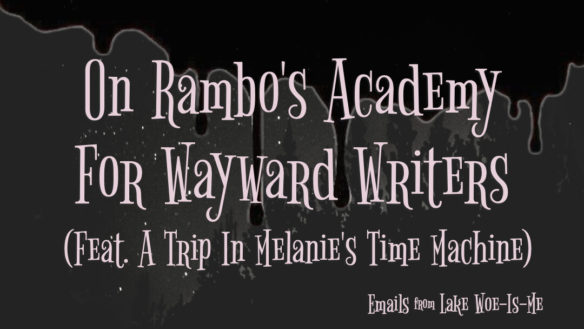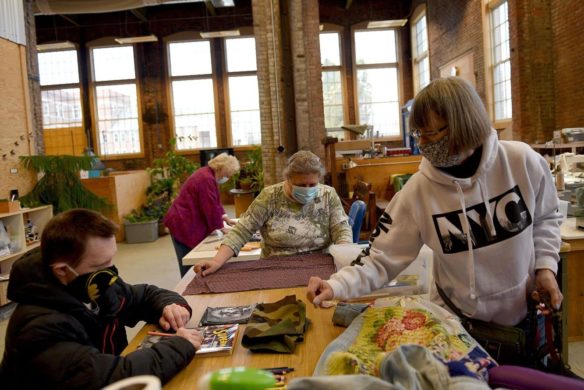

[Introduction: Melanie Stormm is a multiracial writer who writes fiction, poetry, and audio theatre. Her novella, Last Poet of Wyrld’s End is available through Candlemark & Gleam. She is currently the editor at the SPECk, a monthly publication on speculative poetry by the SFPA. Find her in her virtual home at coldwildeyes.com. Wipe your feet before entering.]
Hello All, Melanie here!
For the last year and a half, we’ve rubbernecked Writer X’s misadventures in writing fantasy together. This week, I took two classes at The Rambo Academy For Wayward Writers, and I’d like to do something a little different.
You see, I’ve got things on my mind that I think you might identify with. You may find it helpful.
I’d like to tell you exactly why you need to jump over to Cat Rambo’s Patreon & website and sign up right away for everything that looks shiny.
So, if you’d like to learn how to
- get fewer rejections,
- FINALLY finish that novel,
- gain insightful feedback that makes your stories sing,
- feel yourself grow as a writer,
- experience community,
…or check out my time machine. Read on!
But first…
Let’s start with a seemingly unrelated story.
Last spring, my partner and I toured an expansive artists’ workshop filling a century-old factory renovated into the Makerspace. Our jaws flapped open as we strolled from one light-filled area to another.

Here was the textile workshop. Behold, the $7,000 embroidery machine, the cutting table wide enough to arrange a sofa and coffee table on top of it. A commercial machine could mow through leather or sail cloth if needed.
A short trot away was the jewelry-making shop, fully equipped with workbenches installed at the correct lower height, and tiny tools organized in drawers in the sequence you use them. Someone even thought of installing a wheely chair, knowing that jewelers frequently kick off from one spot of the workshop to land at another without breaking their workflow.
There were C&C machines, a graphic design lab, and a ventilated area for metalworking that hosted looming machines. My partner’s eyes lit up like he was greeting old friends. There was a fully-equipped professional woodworking shop with a lathe (and wood available to purchase should you need it.)
Of course, we couldn’t sign up fast enough. For a low monthly fee of about $100 per person, a craftsman can access all of the equipment and space available whenever they need it. There were also classes available for each machine or skill represented in the area should they want to try something new. Never worked a lathe but want to start this project? There’s a class for that!
My partner holds a degree in ceramics and jewelry making, focusing on metalwork. We have a one-room workshop here at home. The ventilation is a hot mess, to say nothing of the thin layer of sawdust that eventually coats everything. So if he wants to create certain things—or weld at all, he can’t. Or he has to figure out how to do it in a tiny space.
But we fixed that! It costs us about $1200/yr; that’s the cost of a quality wood lathe we don’t have room for.
It’s amazing what having a sprawling space with all the right tools in all the places will do for an artist.
Likely you see where I’m going; stay with me. We’re SFF nerds, so hop into this time machine, why don’t you?
…Just as soon as I clear a path to it. Don’t mind these stacks of unedited manuscripts everywhere; I’m sure they’re not a fire hazard.
Would you mind holding this Wampanoag steampunk alternate history? Thanks, I appreciate it. I just have to push aside this far-future sci-fi set in a hard drive.
I keep meaning to get back to these stories. Arrange, polish, and send them off to new homes. But it’s a bit cramped in here.
The time machine! I think we have things cleaned up enough to work the door. Yes, that’ll do. Climb on in, Filer!
I’m taking you back to an important moment in my life. It’s dark, but notice the window lit on the second floor of a duplex in the middle of a dilapidated neighborhood? That’s where we’re headed.
A little girl is on the other side of that window, gazing out at the rain and the frowning buildings. She’s about six years old. She’s knelt in front of a trunk shoved under the window. She peers through rain-streaked glass at the avenue where broken bottles roll off curbs. Stragglers huddle under laundromat awnings to shelter from the weather. It’s a depressing view.
But wait.
The rain smears the view from the window. Either that or this is the exact moment the little girl has begun to need glasses because the avenue blurs, and the rust spots on the oversized cars struggling down the street disappear. The vehicles are altered, displaced. Even the street lights are displaced; the light that starts in one world lands in another.

In the distance, two giant smokestacks with red blinking lights guard the horizon, but tonight, the smoky black plumes blow horizontally so that they no longer appear as smokestacks of the factory the girl’s uncles work at but instead become a giant torii gate. A torii as big as the world.
The street in front of her becomes another world. She’s gripped by the notion that every window looks out at the beginning of a story. One is unfolding before her; if she doesn’t write it down, she’ll miss it.
The little girl runs away long enough to return with paper and pencil. She begins to write.
As the awkward letters stretch across the page, something feels familiar. It feels right. Like stumbling behind the curtain in Oz, instead of finding the wizard, she has found herself.
Oh, she thinks, that’s right. This is who I am, and this is what I’ll do. I’m a writer. I remember now.
This is not an Arthur pulls the stone from the sword moment—or whichever way that thing goes, but we each have our own compass in our chest. And sometimes that compass turns into a boombox, stands outside our window, and blasts Peter Gabriel’s “In Your Eyes.”
That’s happened to you, yes?… Well, this is an awkward silence, isn’t it?
Let’s jump ahead in time—oh. Sorry. Small technical difficulty here. You see, one of my many dead pens has become wedged in the recess of the control arm. Would you have something small enough to reach down in there and dislodge it?
You do? You’re a lifesaver! I’d hate for us both to get stuck in 1986 like the last guy did. Forget I mentioned him; he’s not important. So instead, here’s a great place to bring up a few rules on writing SFF.
1.) Writing is a skill you spend your life learning.
My first workshop was when I was twelve. It was an adult mystery writing workshop. Adult Me sympathizes with the actual adults who had to attend a workshop with a twelve year old.
I was a writer, and I wrote. Mostly fantasy stories torn from Alexander’s Prydain and Edding’s Belgariad. I attended an art school in high school and majored in Creative Writing. It was a rigorous program and I wouldn’t understand how rigorous until I hit college.
I graduated with a high school diploma, a diploma in Creative Writing, and a sense that my teachers waited with baited breath for the day I would get writing SFF out of my system.
Writers need a well to draw from, and mine needed deepening. So, after an uncanny stroke of luck, I went on the road for fifteen years to see the world, human beings, and learn how to write songs. I wrote lots of fantasy but no longer had a critique group. I traveled too much to find a local group.
Online classes were in their early years, so I went to school that way. Out of a formal degree program, I studied and practiced copywriting. I bought every book on writing I found and read them in airports, on busses, and in diners at three in the morning. Finally, I returned to school (yet again) and got my degree in writing fiction, to the endless surprise of everyone who had been under the impression that I was a musician.
I submitted nothing.
You see, I have this problem. I have a lot of tools, and they’re everywhere. Some of them are buried so deep I need you to help me move my time machine to lug them out. I’m also missing tools.
And in writing, you don’t just need tools; you need applied practice with each.
2.) Writing requires many skills to bring one story to the market. That means to do it successfully…you have to do it successfully. You must perform each skill to one degree or another. Description. Characterization. World Building. Dialogue. The rough draft. The revised draft.
Then there are other critical skills: deciphering beta readers, writing a slug line, developmental editing, writing a query letter to an agent, writing a book proposal, and publicizing your work.
You not only need to know how to shape a clay pot, but you also need to study glazing and pot-selling. Specialized rules and ways of thinking take years of trial and error. You don’t have to get each of these perfect, but you need to be proficient at most if you’d like this stuff to hurt less.
It’s overwhelming. You know which skill you’re lacking because its mention fills you with dread.
3.) Writing is necessarily solitary.
Call me crazy, but you’ll never get that space opera written while splitting hot wings at a karaoke contest. Ditto on writing while at parties, talking on the phone, doom scrolling through Twitter, or binge-watching Stranger Things.
To write a draft is to choose to make time to be alone in your life, your day, and your week. You will have to ask yourself innumerable hard questions in that time alone. Shudder.
This is writing’s Eternal Truth except for the other pesky Eternal Truth.
4.) Writing is necessarily a collaborative process.
It’s no coincidence that J.R.R. Tolkien and C.S. Lewis knew each other and that we know them. Nor is it a coincidence that Hemingway and Fitzgerald were once chums and that we know who they are, too.
Whatever some professors have insinuated, SFF stories are art, and art happens in communities. In fact, communities are where the best art happens and where potentially great artists reach that potential.
Years ago, I attended an online poetry workshop led by the indomitable Chen Chen. A fellow attendee had received a sizable poetry award and was celebrated. She confessed that she was in the workshop because she writes better when she’s workshopping.
I’ve noticed the same in my own work.
You deserve to see your work from another’s eyes before you rear your massive throwing arm and hurl it into an editor’s face.
But I’m gonna put something else in front of you.
You deserve a workshop. Whether struggling through your very first story, querying an agent, or reaching delightful levels in skill, you deserve a space equipped with all the resources. You deserve a space that helps you switch from writer to editor and back again.
If you craft science fiction, fantasy, or horror, you’ll find that space at Rambo’s Academy for Wayward Writers. (Cat doesn’t know I’m writing this, I get nothing for this, I’m simply committed to sharing an excellent writing thing when I love it.)
In November, I completed a draft of an epic tome that took me more than twenty years to write. This was euphoric and disheartening. (You’ve seen the stack of unedited drafts surrounding my time machine.) How could I edit this when I couldn’t bring myself to edit that steampunk thing I had you hold?
I avoid things when I’m overwhelmed. It’s like walking into my partner’s dust-covered shop. I want to run away. I have eight novels moldering on my hard drive that I don’t touch because, as comfortable as I am with short fiction, novels are lumbering beasts that can crush you like a rancor in the throes of a do-si-do.
So I enrolled in Cat Rambo’s “First Draft Novel Blues”, a two-hour workshop that gives you the start of your precise roadmap to work through your novel. It was a process changer.
Much of what Cat went over at the tail end of their class is stuff I’m well-versed in, but it only helps to refresh. I enjoyed listening to it from their years of experience. However, what they delivered in the first half of the session has me looking forward to revising that novel AND the steampunk one.
That is if you didn’t lose it. Where did you put it? I’m looking around, but… Oh! Phew. There it is.
For a tiny monthly donation (TWO BUCKS), you can access the Chez Rambo discord where there are opportunities to have your work critiqued by other writers. There’s moral support for when you receive the inevitable rejection and celebration when you score a sale. There are guidance, tools, and classes. Patreon supporters gain access to a free class each month. This month it’s on writing food in SFF. Next month, it’s story fundamentals, so sign up!
Are you familiar with Clarion West? Maybe you’ve attended. It is a game changer for those SFFs who can attend, or so I’ve heard.
Most of us will never have the opportunity to attend. Some of us have families that can’t part with us for six weeks, or jobs, or health conditions, or financial circumstances that keep us from being able to participate. And yet, you also look out windows and see new worlds and new stories beginning, and you deserve Clarion-level resources, too. We can’t learn about those window worlds if you’re not writing them down, revising them, and sending them boldly into the black.
This is my favorite benefit of Rambo’s Academy: some of the teachers and workshops available at Clarion West teach at Rambo’s Academy for Wayward Writers, and they do it year-round.
Here are just a few classes I’m considering for next year.
How To Create Your Own Genre with Henry Lien (Jan. 8th)
Project Management for Writers with Jen Brozek, (Feb. 12th)
Wrangling Short Stories with John Wiswell (Jan. 22nd)
Then, there’s accessibility. If these are financially out of reach, there are scholarships available. You don’t have to fly anywhere; you attend from home.
I wonder if Cat is offering classes in Writer X’s reality?
If you’re shy and new to all this, you already know someone in that community. I hope you consider joining, and if you do, let me know if you’re there. I look forward to hearing about your worlds! You can find me as MelstressoftheDark on the discord server or look for me.
I’ll be racing by on the wheely chair going “Wheeeeeee!”
I’m curious. What’s your writing story? What classes or courses have worked for you? Do share!
Discover more from File 770
Subscribe to get the latest posts sent to your email.

I like this! It’s a great description of why you do what you do. I’m glad you found your direction and the life experience and put it all together. My personal moment was later in life, realizing that I was passionate about engineering and I had found my calling. Writing is a part of that, but the stories I tell are about how programs work. If I tell a story well enough, the program might actually work the way you want.
Tom,
That is fascinating. Thank you for reading and thank you for sharing. I’m particularly intrigued by your comment: If I tell a story well enough, the program might actually work the way you want.
I fall into the camp of people who see stories as problem-solving technology. That’s not their only function, but stories rely on patterns and are capable of generating patterns that are quite complex. Describing the problem is most of the story, and most of the solution. I’m less familiar with programming, but it is a language and your description of that similarity will stick in my brain, I guarantee.
Just want to echo the general sentiment boosting Cat Rambo’s Wayward Academy classes. I’ve taken a few and they’ve all been fantastic. Can also recommend the community on the Discord server you get to join when you sign up on the Patreon. Been trying to rearrange my schedule so I can go back to attending the morning co-writing sessions on Zoom – they were so good for my productivity when I was able to make them!
Nicole, you say there are morning co-writing sessions? I was 90% of the way convinced already, but I think that tidbit brings me up to a full charge. I’m going to go check it out.
I really appreciated this. This community matters so much to me and I’m glad to see folks finding it rewarding. Our members reported some super nice acceptances this month, including one to Fantasy Magazine, which pleases me enormously. And so many cool classes coming up early next year, including a couple that are still in the works. 🙂
I would feel remiss if I didn’t mention than you can buy someone a Wayward Academy gift certificate if you’re holiday shopping – http://www.kittywumpus.net/blog/2022/12/15/if-youre-shopping-for-gifts-that-dont-need-shipping-for-a-writer/
There is in fact a robust schedule of co-writing sessions, most of them designated “feral” (no moderator/facilitator, just people show up via the designated Zoom link), across the full day’s spectrum, which is very helpful when your community spans many time zones. The general format is a quick hello and “what are you working on today?” followed by half an hour of everyone muting their mics and writing, then coming back together to check in and do it again.
But yes, when I was more regularly attending, there was a session that started at 8 am PT, which gave me some good “get up in the morning and go to work on time” motivation. I’m pretty sure that session still exists. I really need to get back into it.
Also, speaking of the classes, did y’all know there are also self-led classes you can go through at your own pace? Cat’s had an end-of-year sale on those for a couple years running. I have so! much! homework!
(Hi Cat!)
Nicole, you’re so right! I forgot to mention all the self led classes/workshops. So many! Seriously, Cat is a Fully Equipped Writing Universe.
(THANK YOU, CAT!)